Category: Benefits of Music
The Bountiful Benefits of Basket Rides
Wheeee! Bet your toddler loves going for rides in your laundry basket. What you may not know are all the developmental benefits you are giving your child in these moments, and some of the ways you can make this an even more beneficial experience for you and your little one.
View this post on Instagram
First, notice how these parents work smarter, not harder, by having a scarf or rope attached to the basket enabling them to stand up and protect their back muscles. (These are the kind of parenting tips our experienced Kindermusik educators share to set you up for success.)
Second, each parent is respecting their baby’s needs during this activity. Some little ones are enchanted by being pulled in the basket, others want to be close and cuddle as they are parading around the room. Toddlers who are totally focused on walking may want to put their favorite stuffed animal in the basket and push it around themselves!
So let’s highlight some of the benefits of this traveling laundry basket experience.
Balance and Coordination
Sitting upright in a laundry basket as it is moving forward and side to side activates and strengthens your child’s core muscles, and is a delightful exercise for developing balance and coordination. So if they are old enough to sit up by themselves, place them in the center so they are less inclined to lean back. Don’t worry too much if they do.
Spatial Awareness
As your child sees and feels themselves traveling through the room, they are becoming more aware of where they are in relation to the space around them. Your child is developing the spatial awareness they need to navigate the world around them.
Sensory Stimulation
Whether your child is sitting directly on the grooves in the bottom of the laundry basket, or a soft towel or blanket on the bottom, they are getting sensory input from the density and textures on their skin as their body moves around on top. Try it with a load of warm laundry for additional sensory input. Both the warmth of the clothes and the scent of the fabric softener strengthens the building of strong neural connections.
As your toddler’s eyes see objects move past them, they are becoming more observant of their environment and how things look from different perspectives. To activate the same effect with their hearing, have music playing in one room, and move past the door to that room so your child’s ears hear the changing location of the sound.
Imaginative Play
Does your child love trains? Create chugging sounds and train whistles, and maybe even listen to songs about trains on your laundry basket adventure. Pretend to make scheduled stops and announce the location loudly. There are so many ways to stimulate their ability for imaginative play on a topic they love. If your child loves their stuffed animals, set them up around the house and pretend to be a train traveling around the zoo and talking about each animal. Maybe they can be the zoo expert after your many repetitions. Start by becoming acutely aware of what your child is most fascinated by in this moment, and initiate pretend play accordingly. Then watch as your child starts to initiate it in their own.
ADD Social Interaction
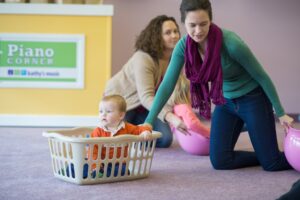 Some of these suggestions are extras you can add that we can’t include in our Kindermusik classes. But your mommy and me time (or daddy and me, grandma and me, nanny and me…) during class provides you with a continual supply activities, music, and information to level up your daily play at home. You will both meet new friends with your classmates, adding the benefit of socialization and interpersonal connection.
Some of these suggestions are extras you can add that we can’t include in our Kindermusik classes. But your mommy and me time (or daddy and me, grandma and me, nanny and me…) during class provides you with a continual supply activities, music, and information to level up your daily play at home. You will both meet new friends with your classmates, adding the benefit of socialization and interpersonal connection.
It is so easy to sign up and preview one of our classes full of music and movement with your child. Our unique programs for each age (infancy, early toddlerhood and early preschool ages) ensures you are both gaining what you need for each stage of their development.
Let’s nurture these young minds together. Wheee!
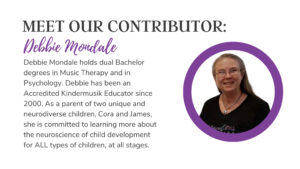
For the Love of Bunnies and Benefits
Does your toddler have a snuggly bunny they LOVE? Then they will LOVE playing this game with their furry friend. For such a little children’s rhyme, there is a lot of learning happening with your expressive interactions and repeated play.
View this post on Instagram
Expand on their Interest
When your child has a strong interest in something, it offers an exceptional opportunity to expand so many areas of their childhood development. Positive emotions attached to learning opportunities result is a longer attention span, interest in repetition, and stronger neural connections for more well-rounded learning. With new and unique ways
to play with their favorite objects, their interest in it will last longer and they become curious to learn more. “What else can I do with this?” This question itself has lifelong benefits for their curiosity and knowledge building.
Language Development
Simply hearing the cadence of rhyme is immersing your child in learning the format and concepts of speech, even in the earliest stages of your baby’s language development. Toddler’s brains are avidly seeking the connection between words and actions, helping with both their receptive language (understanding what others say), and their expressive language (ability to communicate using their own words).
Focused Attention / Observation
When the rhyme says “I see..”, we are reinforcing our child’s observational skills, increase their attention span as they keep looking at an object to find and describe the many things they see with their eyes.
Sign Language
 Even when your child can hear perfectly well, using sign language in coordination with speech has cognitive benefits. When a child can SEE and HEAR the word at the same, they are learning two ways to express the same concept, which builds stronger neural connections leading to easier language development AND, there are times you and
Even when your child can hear perfectly well, using sign language in coordination with speech has cognitive benefits. When a child can SEE and HEAR the word at the same, they are learning two ways to express the same concept, which builds stronger neural connections leading to easier language development AND, there are times you and
your child may want to communicate silently. Using the sign for SEE can be used when you discover a real animal outside and don’t want to scare them, when you are in a quiet place and need to communicate, and so many more life circumstances. Along with the silent mouthing of “Yay” at the end, the wiggling hands in the air is sign language for celebrating. It is also how people who are deaf applaud each other for accomplishments. Having a quiet visual way to celebrate appreciation of your child’s actions can also come in very handy.
Emotional Awareness
“Surprise!” is such a fun facial expression to imitate. AND… It is a fabulous word to use when your child is startled instead of the word “scared”. “Oh, I didn’t mean to surprise you.” may help your child have a more positive reaction, and recover more quickly. As we play around with the facial expressions for sad and happy at the end, two year
olds and preschoolers are learning to read facial expressions and recognize the emotions they are associate with… an amazing start in developing their emotional intelligence.
Turn-Taking prepares for school readiness
At first, you will be chanting the rhyme and moving the bunny. Your child “turn” will likely be to request it again and again. Once the rhyme is familiar, your child may move the bunny while you chant the rhyme. Little step toward letting them take on more of the experience can be leaving off some of the repeated words at the end, and let them say the repeated quiet words. As you continue to leave off more of the ending words their memory for the rhyme is building until they can complete it all themselves. Maybe while you are moving the bunny???
Memorization leads to better reading skills
“Experts in literacy and child development have discovered that if children know eight nursery rhymes by heart by the time they’re four years old, they’re usually among the best readers by the time they’re eight. “- Mem Fox, Reading Magic
Motor Skill Development and Inhibitory Control
As your child moves the bunny along with the rhyme, they are by creating the correct movements in connection with the action words they hear. They are practicing, in a delightful way, when to move and stop, and moving faster and slower. As we highlight how proud they are of this control over their gross motor skills, it will build their desire to
have this control in other situations.
By using two FINGERS outward from a fist, your “hand” bunny can move along with this rhyme and help develop their fine motor skills as well. This can be a great game to play while waiting in line at the grocery store, or in a doctors office. No props needed.
Musical awareness
Last, but not least, this rhyme introduces opposing concepts in a perfect way to develop early childhood development in cognition and music, at first in awareness and progressing toward active skills:
Loud and quiet are introduced by the repeated sounds, with the first three louder and followed by more with a quiet voice.
Crescendo (getting louder) and Decrescendo (getting louder) as well as melodic direction (the pitcho going up and down are introduced with the “bloops” as the bunny hops away (starting loud with a higher pitch) and hops back (starting with a quiet and lower pitch).
Ready for more?
 Now that your child is ready to expand connections to their favorite bunny friend, you can continue to add more. Download the free Kindermusik APP on any mobile device, and enjoy these songs. Once in, click on the MUSIC tab at the bottom, tap on SONGS at the top, and search for RABBIT. “I Saw a Little Rabbit” and “Usagi, Usagi”
Now that your child is ready to expand connections to their favorite bunny friend, you can continue to add more. Download the free Kindermusik APP on any mobile device, and enjoy these songs. Once in, click on the MUSIC tab at the bottom, tap on SONGS at the top, and search for RABBIT. “I Saw a Little Rabbit” and “Usagi, Usagi”
When you and your child participate in our Kindermusik classes with our accredited educators at Grow and Sing Studios, we’d love to hear what your child’s interests are so we can provides songs and activities to expand the things that bring them joy. We have so many resources to make it a little easier for you to connect with your child and
provide life-long benefits in their development. A big bonus when you enroll is accessing a much larger selection of music, books, and more on the Kindermusik App.
Sign up to Preview a Class with us today and see the magic in action.
If you have some favorite rhymes, songs or stories about bunny rabbits you would
recommend to other parents, please share in the comments!

Testomonial from a Kindermusik Mom – Grow and Sing Studios, Orlando, FL
What a wonderful testimonial and peak into our Kindermusik classroom!
******************************************************************
“Thank you to Grow and Sing Studios for inviting us to experience Kindermusik in Lake Nona, connecting through the magic of music! {Hosted}
As a mama, I’m always nervous with how my toddlers will react in new spaces. Seriously, you never know what you’ll get! Today, Ms. Grace welcomed us with open arms and an open heart. She quickly recognized that MJ had strong emotions, and met her where she was. Through music and movement, it was beautiful to see the curiosity and wonder light up in MJs eyes as she engaged a safe distance away. 🥰
🎶 Kindermusik takes musical learning to the next level. In every Kindermusik class, babies and toddlers are welcomed into a playful and nurturing environment where they will sing, move, play instruments, and hear stories—all while developing social skills, problem-solving skills, pre-math skills, and a foundation for reading.
Their research-based curriculum focuses on whole-child development and helps caregivers understand how their child is developing musically, cognitively, and socially.
Classes are available for babies and toddlers.
Summer 2024 Kindermusik Registration is OPEN! Check out the link in stories.
If you’re looking for a safe and educational indoor activity this summer for your babies and toddlers, we recommend checking them out.
View this post on Instagram
Things to do Orlando, baby activities, toddler activities
Newborn Sensory Play: Exploring Scarf Play with Music
 Scarf play with music for a newborn? OH YES! Discover the magic of scarf play with music for your newborn and how it can engage their senses and promote development.
Scarf play with music for a newborn? OH YES! Discover the magic of scarf play with music for your newborn and how it can engage their senses and promote development.
Multi-Sensory Stimulation:
As your baby feels, touches and sees the scarf moving, and hears the music match the movements, so many of their senses are sending messages to the brain all at the same time. In turn, your baby’s brain is absorbing and integrating this sensory information, building neural connections that can become automated awareness, leaves their brain energy for new things to learn.
Interactive Play for Development:
Because infants rely on interactive play with a loving family member to stimulate them, calm them, and enable them feel joy… all which are key to optimal infant development, scarves offer a gentle way to accent your play and spark creativity.
Incorporating Scarf Play in Family Time:
Mommy and me music playtime with a scarf can provide all of that… moving the scarf along with vocal play, describing words, upbeat tunes or sweet lullabies. Daddy and me activities can be a bit more robust, holding baby up to their chest facing out, and marching through the room with a scarf hanging over their legs… swishing on their skin with the movement. Siblings can lay down in front of Baby, facing them for some delightful infant tummy time playing peek-a-boo, or bouncing the scarf to the beat of rhymes they chant. Scarves are actually a wonderful prop for infant play with your whole family seated in a circle around them tossing the scarf to each other and peeking out at baby in turn.
Understanding Your Baby’s Sensory Sensitivity:
Be aware, each baby has their own sensory sensitivity. Now is a good time to carefully watch to see what your baby is communication to you and adjust accordingly. When your baby seems to avoid or whimper during scarf play, you may need to slow down, start with just visual play or only gently touch extremities. Often young babies can become averse to scarf play when it is immediately used on their face and it may freak them out since they don’t understand it. Any peekaboo play should start with your own face, and they will love it. Once your baby knows what to expect, and enjoys this multi-sensory play, they may be eager for more close to the face movement and robust movements.
Enhancing Scarf Playtime:
Try this: Start with vocalizing on “aah” or “ooh” going higher or lower in pitch MATCHING the movements of the scarf above them as they are laying on the floor. (They love your voice, even if you don’t.) You may include describing words to add the benefit of language development. Use directional words such as up-down, around, over-under, in-out, or action words like swoop, swish, swirl, hop, jump, etc.
Add a personal touch by singing your baby’s name. As you slowly move the scarf upward, focus on the first vowel in their name as the pitch in your voice slowly climbs higher before finishing their name in a playful way. Enjoy the same going lower until the scarf rests on their belly. If they reach for it, let them bat it around and maybe even grab it and pull it in toward the center of their body.
Enhance your play by playing some instrumental music and move the scarf along with the flow of pitch, with small movements for quiet music and bigger movements for louder music.
Benefits of Scarf Play:
As a tiny infant, your baby may not be moving their head side to side yet, so seeing the bright blurry scarf flow above them, and hearing the pitch of your voice sync with the scarf movement is an incredible learning experience. As your baby starts to move their head side to side, they are eager to practice and develop their independent eye tracking to watch the scarf glide across their vision.
As your baby reaches for the scarf, they are practicing their ability to extend their extremities, and as they grab at it and pull it in, they are practicing their ability to flex and hold, critical gross motor skills for infants. Stephanie Johnson, in her book “Baby Bare” calls the first three months of a baby’s life the “Squishies” stage, and these specific visual and motor skills are the first most important aspects of their critical early development.
Before babies can try to imitate anything, their brain is programmed to learn quite complex concepts from their experiences. Babies’ brains are primed to create neural pathways for intervals and math through the more rich classical and jazz music. Simply listening is a delightful background for their daily experiences, but interactive play while listening is when the real learning occurs. Once a child begins to try to imitate, we adapt it for their singing range and capabilities.
Choosing the Right Music:
The barbershop quartet version of “Home Sweet Home” on the free Kindermusik APP (available for any mobile device) is found in the Theme: Relaxation, and has a wonderful high and low flow, perfect for scarf play. For a delightful song with verbal directions, enjoy “Up, Up in the Sky” with your little bird. Download the APP today for music YOU will love to listen to repeatedly as well.
Next Step….Kindermusik!
For an ongoing supply of new ideas and music you can use together with your baby, join us anytime during your infant’s first three months with our special Newborn Offer. If your baby is older, sign up today to Preview a Class and see the musical magic in action with other families with newborn infants, and babies up to walking.
View this post on Instagram
We hope this inspires you to embrace scarf play with music as a valuable tool for newborn sensory development, fostering a strong bond and providing enriching experiences for your baby.
With Music and Magic,
Team Grow and Sing Studios

Rocking and a-Rolling Trains the Brain for Balance
By Debbie Mondale, Accredited Kindermusik Educator
Do you wonder why it is so important for our babies to rock and roll – move freely… and why toddlers love repeatedly falling over on purpose or preschool-age children spin themselves silly?
Balancing is not a skill we are born with, it must be trained in coordination with our body and brain. The good news, training for this cognitive development is natural and FUN, and this is a skill that impacts us every day of our entire lives, even essential for our survival. Encouraging children to move creatively is a good start, AND there are many mommy and me type activities that enhance this process.
The movements of our little one’s bodies train their brain to know how their body is positioned in the space around them, where UP is, and how to balance. The video below shows a pretty cool way to demonstrate this vestibular system as it occurs in the inner ear and sends messages to train the brain for balance and so much more.
View this post on Instagram
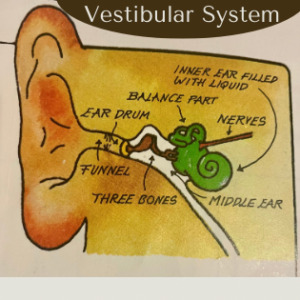
Usborne – How Your Body Works – 1975
The inner ear is a curled up tube with three extra loops which are filled with a liquid, somewhat like the balloon in the video. These loops are also filled with nerves, that go with the flow as we move around and send messages to the brain. As the head and body moves, the liquid stays level with the ground, and the nerve endings tilt from their secured end as the liquid moves. Messages about HOW these nerve endings move are sent to the brain to create neural connections that allow us to subconsciously balance and move through space effectively.
When rolling and spinning round and round, the liquid in the ear whirls around too, even for a little while after stopping, which leaves a bit of a dizzying feeling which children LOVE (adults?… not so much). Spinning sends totally unique messages about balance to the brain and improves focus since coordinating both sides of the body and brain are required.
The more your child’s body moves, in every which way, the more they will be able to coordinate their actions to dance, ride a bike, play sports, and problem solve situations in which they become off balance, stuck, or disoriented.
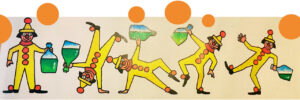
Usborne – How Your Body Works – 1975
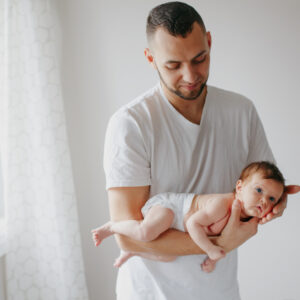
Think about the last time your body instinctively recovered after you stumbled on uneven ground. Have you ever been disoriented under water after a wave knocked you over? These are the moments when all this vestibular training kicks in to save the day.
Movements you do with them, such as rocking, dancing with mom, wrestling with dad, and even fun pillow fights with the family are training the brain. I remember when my son was young, he loved being carried upside down. He insisted for almost a year that THAT is how he wanted to be taken to the bathroom to brush his teeth!
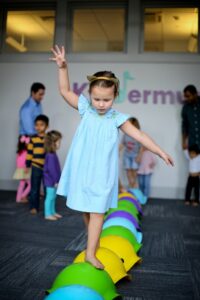
Movements they do for themselves, like nodding or shaking their head, rolling on the ground, falling down, spinning, jumping, tumbling… are naturally processing cognitive development in your child. If you see your child repeating a movement ad nauseum, their brain is actively SEEKING this type of stimulation.
ONE occurrence only makes the brain aware it is an option. Only thousands of repetitions can truly build the neural connections needed to make these reactions instinctual enough to act without thinking about it in an emergency situation. Early childhood development specialists WISH they could share this parenting advice to all young families since the first five years is a critical period for this brain development.
Our job can be as simple as making sure they are in a safe place to move and let them GO! Add maybe add some language development to the mix by describing their actions and how it makes them feel. Adding delightful music during movement multiplies the fun factor and increases their attention span. Download the free Kindermusik APP and get the action going with the songs in the Themes: Body and Playtime.
- As your child becomes more capable, challenge them with creative obstacles that make it fun to move their body in unique ways.
- Indoor diy obstacle courses can include piles of pillows and blanket tunnels and fun objects to pick up and toss in baskets. This can be set up in a living room, or even a hallway to keep them on a forward path.
- It can be so fun to set up their own little ninja warrior outdoor obstacle course with balancing beams, wobbly surfaces, things that spin, tunnels, rolling and tumbling paths, and so much more.
Our Kindermusik curriculum makes this all easy for you as it is designed to provide your child with a wide variety of movement experience. And our Accredited Educators here in Central Florida are specialists that will teach you more about it and provide tools you can use to meet your child’s unique needs for developing their gross motor skills and vestibular capabilities. Join us for a $5 preview class and see the magic in action.
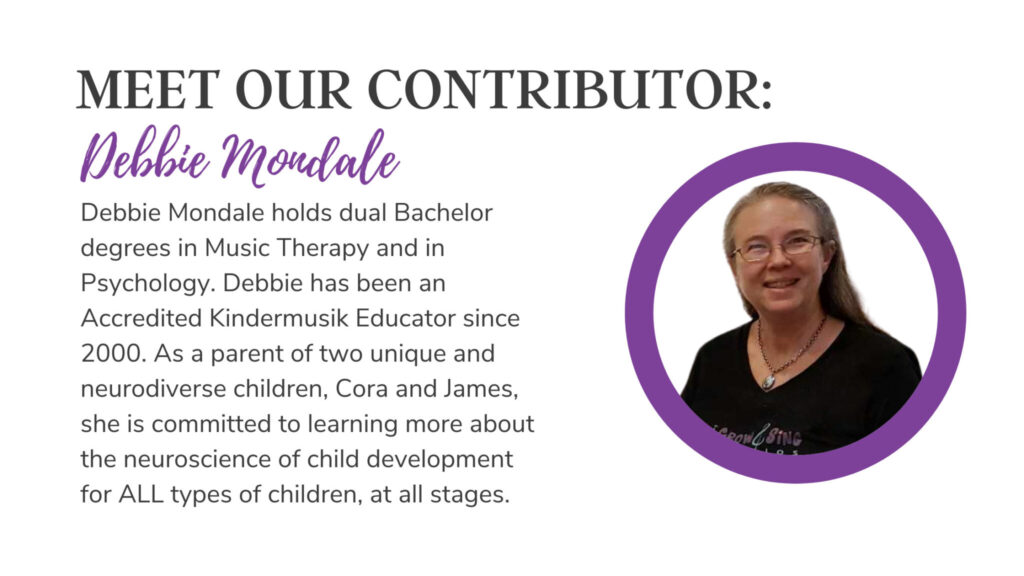
What exactly is sensory integration?
Sensory integration for babies is the process by which their nervous system organizes and makes sense of information received through various senses. Exposing babies to diverse sensory experiences is crucial for their overall development.
View this post on Instagram
Sensory integration, essential for cognitive, motor, and social-emotional skills, lays the foundation for understanding the world. Kindermusik classes here at Grow and Sing Studios offer a structured and enjoyable way to achieve this. Incorporating music, movement, and social interaction, these classes stimulate auditory, visual, and tactile senses simultaneously. The rhythmic nature of music aids language development, while activities like touching textures and interacting with colorful props contribute to sensory exploration. Kindermusik provides age-appropriate, carefully crafted experiences that promote holistic sensory development, making it a delightful and effective avenue for caregivers to nurture their baby’s growth.
Explore Kindermusik Classes Today! Try a class for $5 Visit growandsing.com for more information.

#SensoryDevelopment #KindermusikClasses #ParentingInsights #oviedoflorida #orlandodads #parentingorlando #orlandolocal #MusicalExploration #EarlyMusicEducation #PlayfulLearning #SensoryDiscovery #MusicForKids #EducationalPlay #ExploreWithMusic #CognitiveDevelopment ##Kindermusik #BabyMusic #ToddlerActivities #ParentingJoy #OviedoKids #OrlandoFamily #BaldwinParkParents #AvalonParkLife #StoneybrookEast #WinterParkBabies #WinterGardenMoms #lakenonamoms #MusicalBabies #GrowAndSing
Join us for $1 Baby Days here at Kindermusik with Grow and Sing Studios
This goes out to all the new parents and grandparents out there!
If you have a friend or family member with a new baby, please forward this invitation to them. Thank you!
Congratulations on the newest addition to your family! As fellow parents, we understand the joy, challenges, and occasional isolation that come with the beautiful journey of parenthood. It’s easy to feel overwhelmed and alone, especially in those early days.

At Grow and Sing Studios, we’ve created a warm and welcoming musical community through our Kindermusik classes. We recognize that large group activities can be intimidating, which is why our classes are intentionally small, ensuring a cozy and supportive environment for you and your little one.
Join us for our Special Baby Days offer from November 27 to December 1, 2023!
For just $1, you and your baby (newborn to walking) can experience the magic of our Kindermusik Foundations class. This exclusive offer is our way of reaching out to parents like you, providing a space where you can connect with others who are navigating the same exciting, yet challenging, parenthood journey.
Why Choose Kindermusik at Grow and Sing Studios?
Intimate Community: Our small class sizes foster genuine connections, allowing you to build a supportive network of fellow parents.
Expert Guidance: Led by accredited instructors, our Kindermusik Foundations class introduces your baby to the joy of music while offering valuable insights on early childhood development.
Multiple Locations: With classes in Oviedo/UCF, Winter Park, Baldwin Park, Lake Nona, and Winter Garden, we’re conveniently located to serve families across Central Florida.
How to Sign Up:
Click here and follow the instructions.
Select the Foundations class in your preferred location.
Use code BABYDAYS23 in the additional information section to unlock this special $1 offer.
Don’t let the isolation of early parenthood overshadow the joy it brings. Join us at Grow and Sing Studios, where every note is a step towards building a supportive community for you and your baby.
We can’t wait to welcome you to the Kindermusik family!
P.S If you have a toddler, we invite you to come preview anytime! : )
All the very best,
Holly and Will Lesnick, Owners
Grow and Sing Studios
The importance of socialization for babies and toddlers
As a parent, you may be tempted to keep your baby cocooned in the safety of your own home, away from the germ-ridden playgrounds and other children. However, research shows that socializing with other babies and children can provide numerous benefits for your little one. Lets explore the benefits of babies socializing with each other.
1. Boosts Cognitive Development
Interacting with other babies and children can help your baby develop their cognitive skills. When babies engage with other children, they learn how to communicate nonverbally, make eye contact, and use their own voice to communicate. This helps them develop their language skills and improve their social and emotional intelligence.
2. Enhances Motor Skills
Playing with other babies can help enhance your baby’s motor skills. When babies are around each other, they learn how to crawl, walk, and move around in different ways. They also learn to grasp objects, throw things, and manipulate toys. These physical interactions help build their fine and gross motor skills.
3. Boosts Confidence and Self-Esteem
When your baby socializes with other babies, they learn how to interact with different personalities and temperaments. They learn how to share, take turns, and cooperate. This helps build their confidence and self-esteem, and they feel more comfortable around others.
4. Encourages Empathy and Compassion
As babies grow and learn to socialize with others, they begin to develop empathy and compassion. They learn to recognize and respond to the emotions of others. This can help them develop a strong sense of empathy and compassion that will serve them well throughout their lives.
5. Builds a Strong Social Foundation
Socializing with other babies and children helps your baby build a strong social foundation that will benefit them throughout their lives. As they learn to interact with others, they develop communication skills, social skills, and emotional intelligence. These skills will help them build healthy relationships with others and navigate the complexities of social situations.
View this post on Instagram
So, don’t hesitate to take your baby out to meet other babies and children, and let them develop their social skills from an early age. Of course, Kindermusik is such a great option for this socialization.
Try a Kindermusik class for your baby or toddler at Grow and Sing Studios for only $5.
CLICK HERE FOR A $5 IN-PERSON PREVIEW
CLICK HERE FOR A $5 VIRTUAL PREVIEW
We can’t wait to meet you!

Why is Barefoot Best for Baby?
👣Barefoot is often considered best for babies for a few reasons:
1. Helps with sensory development: The soles of the feet have numerous nerve endings that help your baby understand their surroundings. By being barefoot, baby can feel different textures and surfaces, which can help with their sensory development.
2. Promotes proper foot development: When babies are barefoot, they can move their feet and toes freely, which allows for the natural development of the muscles, tendons, and ligaments in their feet. This can help with their balance and coordination as they learn to walk.
3. Allows for better grip: Bare feet can provide a better grip on smooth surfaces, which can help with walking and prevent slipping.
4. Allows for natural cooling: A baby’s foot can be a natural to regulate their body temperature. Being barefoot allows the baby’s feet to breathe and cool down if they become too warm.
However, it’s important to note that in certain situations, such as when a baby is outside in cold weather or on rough surfaces, it may be necessary to provide them with protection for their feet. It’s always a good idea to consult with a pediatrician for advice on what is best for your baby’s specific needs.
View this post on Instagram
#barefoot #noshoesforbaby #babyshoes #babies #Kindermusik #parenteducation #parenteducator #parenttips #parentinginfo #motherhood #fatherhood
😞Feeling stressed? Let us help!
|








